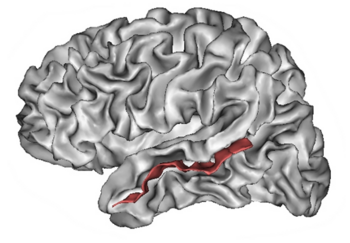Superior temporal sulcus: Difference between revisions
Jump to navigation
Jump to search


imported>Daniel Mietchen (image legend) |
imported>Daniel Mietchen (image legend) |
||
| Line 1: | Line 1: | ||
{{subpages}} | {{subpages}} | ||
{{Image|Superior temporal sulcus.png|right|350px|The [[ | {{Image|Superior temporal sulcus.png|right|350px|The [[central surface]] of the [[human brain]], with the superior temporal sulcus highlighted.}} | ||
The '''Superior temporal sulcus''' (commonly abbreviated STS) is the dorsal one of the usually two [[sulcus (neuroanatomy)|sulci]] in the [[temporal lobe]] of the [[primate brain]]. Part of it belongs to the [[auditory cortex]] and as such, it is involved in [[speech perception]] and [[music perception]]. It also plays a central role in [[face perception]]. | The '''Superior temporal sulcus''' (commonly abbreviated STS) is the dorsal one of the usually two [[sulcus (neuroanatomy)|sulci]] in the [[temporal lobe]] of the [[primate brain]]. Part of it belongs to the [[auditory cortex]] and as such, it is involved in [[speech perception]] and [[music perception]]. It also plays a central role in [[face perception]]. | ||
Revision as of 16:45, 1 May 2010

(CC) Image: Lefèvre and Mangin, 2010
The central surface of the human brain, with the superior temporal sulcus highlighted.
The central surface of the human brain, with the superior temporal sulcus highlighted.
The Superior temporal sulcus (commonly abbreviated STS) is the dorsal one of the usually two sulci in the temporal lobe of the primate brain. Part of it belongs to the auditory cortex and as such, it is involved in speech perception and music perception. It also plays a central role in face perception.